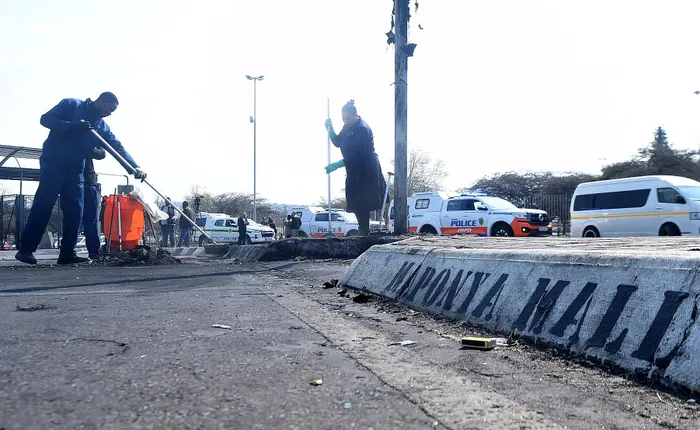MEC returns to Maponya Mall as Soweto seeks lasting calm

Community members clean outside Maponya Mall in Pimville, Soweto, which reopened after the tragic killing of e-hailing driver Siyanda Mvelase, who was shot and his car set ablaze outside the mall on Wednesday night.
Image: Itumeleng English/ Independent Newspapers
Although the smoke has cleared and Maponya Mall has reopened, tensions remain high in Soweto following the killing of an e-hailing driver who was shot and set alight in his car outside the mall last week.
Gauteng Transport MEC Kedibone Diale-Tlabela is now expected to return to the mall today, Monday, August 18, to meet with management and law enforcement in another attempt to bring stability to the area.
Last week Diale-Tlabela addressed the grievances of Soweto residents, imploring all parties involved to seek peace. “E-hailing drivers and taxi drivers must coexist without fear of violence between them. We need a united approach,” she said, as the community called for sustained police presence and engagement.
But residents say they are still living in fear, uncertain whether the violence is over or only paused.
When the Saturday Star visited the area on Friday August 15, about 20 minibus taxi drivers were locked in a closed meeting and refused to speak to the media.
The silence comes amid growing frustration from residents, who say the conflict between taxi operators and e-hailing drivers has been escalating for months without meaningful intervention.
One community member, who did not want to be named out of concern for his safety, spoke about the unrest, noting that this latest incident is not isolated, as similar acts of violence have occurred before, highlighting the ongoing struggles commuters face in Soweto.
“Last year the same thing happened but inside the mall. A car that belongs to an e-hailing driver was burnt down. It was saddening to see that they are being bullied. They cannot force us to use their taxis. For instance, we have the elderly that can barely endure sitting in a taxi for long hours. People should be free to do what they want with their money. This has long been brewing because people are tired. This case where someone lost their life made the community take a stand.”
Another vendor commented on the ongoing sense of insecurity, “Despite things appearing calm, we never know what can happen tomorrow; the tension around Soweto is still very real. The situation is bad for e-hailing drivers because they also need to feed their families. They also live in fear because taxi drivers are in control at the mall. People are also fearful because they cannot use e-hailing, though it is a matter of choice. What happened is tragic; it was sad to see someone lose their life like that.”
The death of the 27-year-old driver, Siyanda Mthokozisi Mvelase, has evoked widespread outrage. The E-hailing Partners Council (EPCO) released a statement offering condolences, stressing that Mvelase’s murder is part of a larger pattern of violence against e-hailing operators in areas such as Soweto, Johannesburg, and Tembisa.
“We are devastated by the unwarranted attacks against e-hailing drivers. This intentional and barbaric killing cannot be overlooked,” EPCO remarked at a time when the community is desperately seeking solutions to the violence.
On August 12, in response to a concerning report that reported 12 deaths linked to e-hailing-related violence in just one week, SAPS Lieutenant Colonel MJ Moletsane convened a meeting with community leaders. Reports indicated that these assaults could be premeditated executions targeting operators.
The South African National Taxi Council (SANTACO) has also weighed in, attributing the unrest to unresolved regulatory issues stemming from delays in implementing the amended National Land Transport Act (NLTA).
“This regulatory vacuum has created an environment where many e-hailing operators are operating without government-authorised permits. The current structure of e-hailing platforms does not enforce the requirement for these permits, leading to a flood of unregulated operators within the public transport space. This unrestrained influx is not only causing congestion in the sector but also posing serious safety threats to commuters. There has been a disturbing rise in reports of hijackings, abductions, sexual harassment, and other violent crimes, all linked to the unchecked operation of e-hailing services under the current legal loopholes. As the apex body representing various modes of public transport in South Africa, SANTACO cannot remain silent,” SANTACO stated, highlighting the crucial need for a framework to ensure operational safety and oversight.
In a resonant call to action, Build One South Africa (BOSA) condemned the cycle of violence, urging prompt law enforcement measures to restore safety. “No South African should fear for their safety while commuting. This issue is not unique and requires an urgent response from authorities,” they declared, underscoring the urgency of resolving the continuous confrontations between taxi and e-hailing drivers.
anita.nkonki@inl.co.za
Saturday Star
anita.nkonki@inl.co.za
Saturday Star